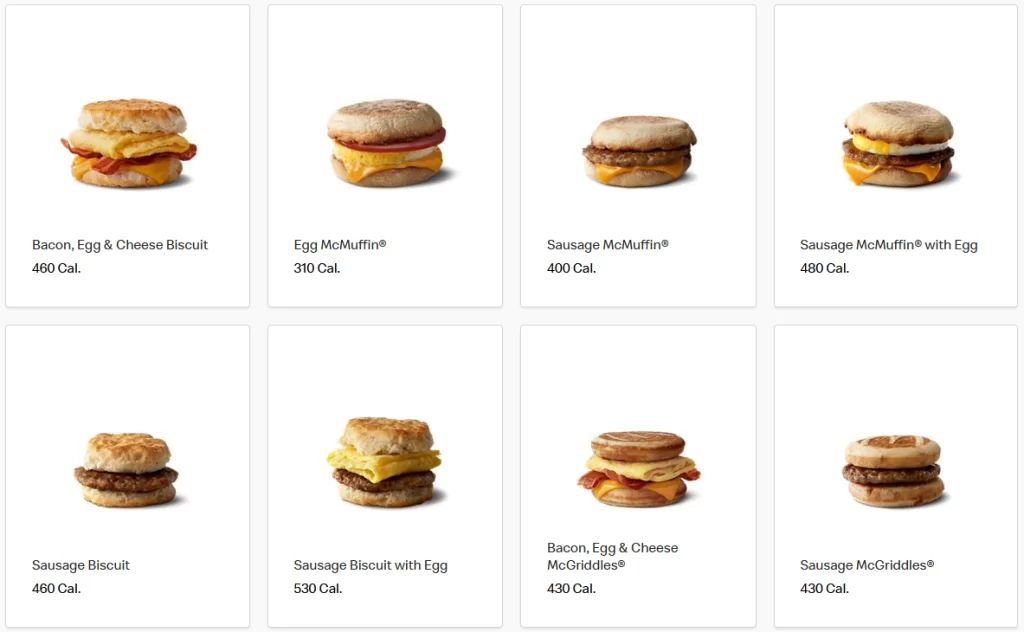Is McDonald’s Breakfast Healthy?

Breakfast is often referred to as the most important meal of the day, providing fuel and nutrients to kickstart our mornings. With our busy lives, fast-food breakfast options have become increasingly popular. McDonald’s, a renowned fast-food chain, offers a wide array of breakfast items that are convenient and readily available. But the question remains: Is McDonald’s breakfast healthy? Let’s dive into the nutritional aspects and explore whether these menu options align with our health goals.
Nutritional Profile of McDonald’s Breakfast Items
When it comes to evaluating the healthiness of McDonald’s breakfast, understanding the macronutrient composition is essential. The popular Egg McMuffin (310 Cal), for example, provides a balanced mix of carbohydrates, protein, and fat, making it a relatively balanced choice. However, other items such as Hotcakes (580 Cal) and Sausage Meals, Sausage McMuffin (400 Cal) tend to be higher in carbohydrates and fat while being lower in protein.
In terms of calorie content, some McDonald’s breakfast meals can be higher, particularly those that include sausage, bacon, or biscuits. Opting for lighter options like the Fruit & Maple Oatmeal (320 Cal) or the Egg White Delight McMuffin can help keep the calorie count in check.

Another aspect to consider is the sodium and sugar content. While some McDonald’s breakfast items, like the yogurt parfait, offer a healthier choice, others may have higher levels of sodium and added sugars.
Assessing the Ingredients and Food Quality
Examining the ingredient lists of McDonald’s breakfast items reveals a mix of components. While some ingredients are familiar, others might raise concerns. Preservatives, additives, and artificial ingredients are commonly found in fast food, including McDonald’s breakfast options. Regular consumption of these additives may have potential implications for our health.
Considering the sourcing and quality of ingredients is also crucial. McDonald’s has made efforts to improve the quality of their eggs and meat, committing to cage-free eggs and eliminating antibiotics in their chicken. However, it’s important to remain aware of where the ingredients come from and their overall quality.
Health Considerations and Alternatives
Individuals with specific health conditions like obesity, diabetes, or heart disease should carefully consider the impact of McDonald’s breakfast options on their well-being. These meals, often high in calories, unhealthy fats, and added sugars, may not align with the dietary needs of those with these conditions.
However, it’s possible to make healthier choices at McDonald’s. Opt for alternatives like the Egg White Delight McMuffin or the Fruit & Maple Oatmeal, which offer lower calorie and fat content. Customization options, such as substituting sausage with Canadian bacon or choosing grilled instead of fried options, can also contribute to a more balanced breakfast.
It’s essential to remember that moderation and overall dietary balance are key. While occasionally enjoying a McDonald’s breakfast can fit into a balanced eating plan, relying solely on fast food options may compromise overall health. Prioritizing whole, unprocessed foods as the foundation of a nutritious breakfast is always the ideal choice.
Making Informed Choices and Seeking Balance
When selecting McDonald’s breakfast items, making informed choices is crucial. Take the time to review the nutritional information provided by McDonald’s, either on their website or in-store. This allows you to assess the calorie, fat, sodium, and sugar content of the items you’re considering.
Portion control is key when it comes to fast food breakfast. Be mindful of serving sizes and avoid supersized meals. Opt for smaller portions or consider sharing a meal with a friend to manage calorie intake effectively.
While McDonald’s breakfast can be convenient, it’s important to prioritize a well-rounded breakfast from whole, unprocessed foods whenever possible. Incorporate fruits, vegetables.
Conclusion
While McDonald’s breakfast options can be tempting, it’s essential to approach them with awareness and moderation. Understanding the nutritional profile, and ingredients, and making informed choices allows you to strike a balance between convenience and health. Remember, fast food breakfast should be an occasional treat rather than a regular habit. Prioritize whole, unprocessed foods to fuel your mornings and set yourself up for a day of healthy eating.






